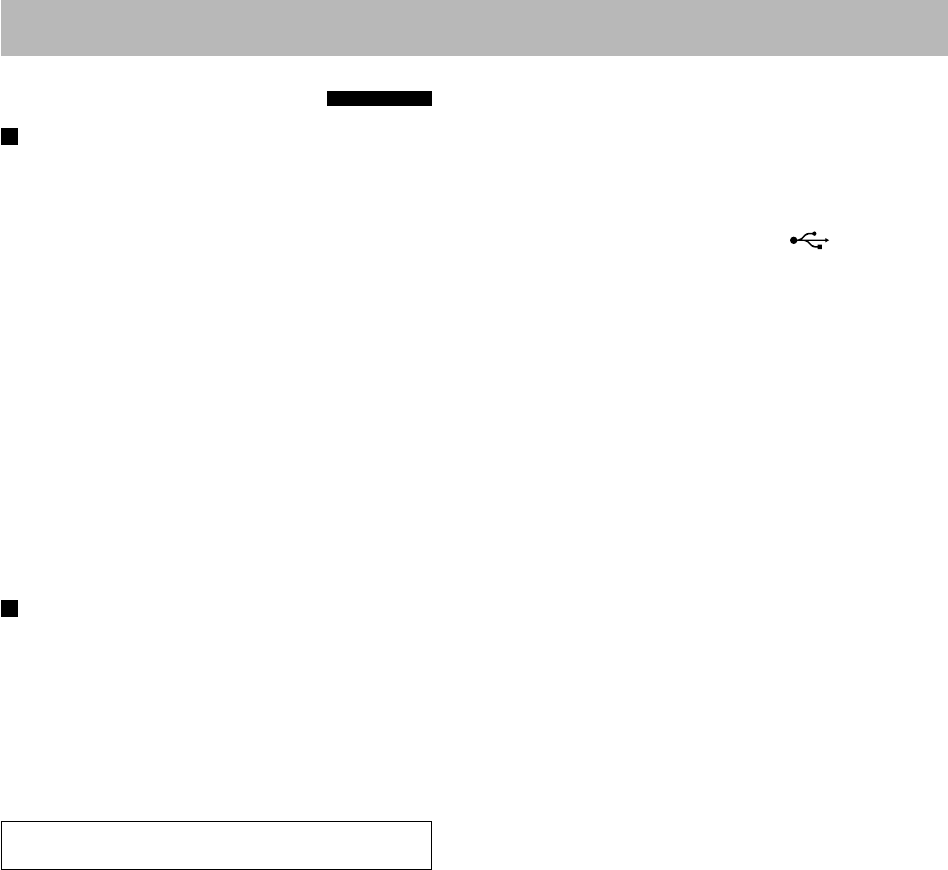
33
Additional Information
Learning More about This System
Connections (see pages 4 to 7)
• Make sure the antenna conductors do not touch any
other terminals, connecting cords or the power cord.
Also, keep the antennas away from metallic parts of the
System, connecting cords, and the power cord. These
could cause poor reception.
• Use only speakers with the same speaker impedance
as indicated by the speaker terminals on the rear of the
System.
• The speakers are magnetically shielded to avoid color
distortions on TVs. However, if not installed properly,
it may cause color distortions. So, pay attention to the
following when installing the speakers.
– When placing the speakers near a TV set, turn off the
TV’s main power switch or unplug it before installing
the speakers.
Then wait at least 30 minutes before turning on the
TV’s main power switch again.
– Some TVs may still be affected even though you have
followed the above instructions. If this happens, move
the speakers away from the TV.
Daily Operations—Playback (see pages 9 to 13)
Listening to the Radio:
• If you store a new station into an occupied preset
number, the previously stored station in that number will
be erased.
• When you unplug the power cord or if a power failure
occurs, the preset stations will be erased in a few days. If
this happens, preset the stations again.
Playing Back a Disc/USB Mass Storage Class Device:
JVC bears no responsibility for any loss of data in the
USB mass storage class device while using this System.
• When you change the source to “DVD/CD” or “USB,” it
may take a while to activate the source.
• While the System is reading a disc, the source may not
change to “USB” properly. In this case, press 7, then
reselect “USB” as the source.
• On some discs, the actual operations may be different
from what is explained in this manual due to the
programming and disc structure; such differences are not
a malfunction of this System.
• The System recognizes up to 999 tracks (files) and 130
groups per disc/USB mass storage class device.
The total number of tracks (files) that the System can
detect is 4 000.
– If there are any unplayable files in a folder, those files
are also counted in the total file number.
– Playable files which do not belong to any groups are
handled as GROUP 1.
• For playback of files in the USB mass storage class
device...
– When connecting a USB mass storage class device, refer
also to its manual.
– Connect one USB mass storage class device to the
System at a time. Do not use a USB hub.
– You cannot charge any USB mass storage class device
through the USB MEMORY REC/PLAY (
)
terminal.
– While playing back a file in a USB mass storage class
device, do not disconnect the device. It may cause
malfunction on both the System and the device.
– This System is compatible with USB 2.0 Full Speed.
– You cannot play back a file larger than 2 Gigabytes.
– When playing a file of a large transfer rate, frames or
sounds may be dropped during playback.
– This System cannot recognize a USB mass storage
class device whose rating is other than 5 V and exceeds
500 mA.
– This System may not play back some USB mass storage
class devices and does not support DRM (Digital Rights
Management).
– It will take some time to start up a digital audio player
whose contents are larger than 1 Gigabyte.
• For DVD-VR playback...
– This System can play only a disc of UDF-Bridge format.
– For details about DVD-VR format and Play List, refer
to the manual of the recording equipment.
• For MP3/WMA playback...
– MP3/WMA discs require a longer readout time than
regular CDs. (It depends on the complexity of the
group/file configuration.)
– Some MP3/WMA files cannot be played back and will
be skipped. This results from their recording processes
and conditions.
– This System can play only a disc of ISO 9660 Level 1 or
Level 2.
– This System can play back MP3/WMA files with the
extension code <.mp3> or <.wma> (regardless of the
letter case—upper/lower).
– It is recommended that you make each MP3/WMA
files as following conditions: At a sample rate of
44.1 kHz and at a data transfer rate of 128 kbps.
This System cannot play back files made at a bit rate of
less than 64 kbps.
• For JPEG files playback...
– It is recommended that you record a file at 640 x 480
resolution. (If a file has been recorded at a resolution
of more than 640 x 480, it will take a long time to be
shown.)
– This System can play back JPEG files with the extension
code <.jpg> or <.jpeg> (regardless of the letter case—
upper/lower).
– This System may not play back JPEG files properly if
they are recorded from a device other than a digital
camera.
UX-L5V[U]6th.indb 33UX-L5V[U]6th.indb 33 09.4.2 11:08:44 AM09.4.2 11:08:44 AM


















